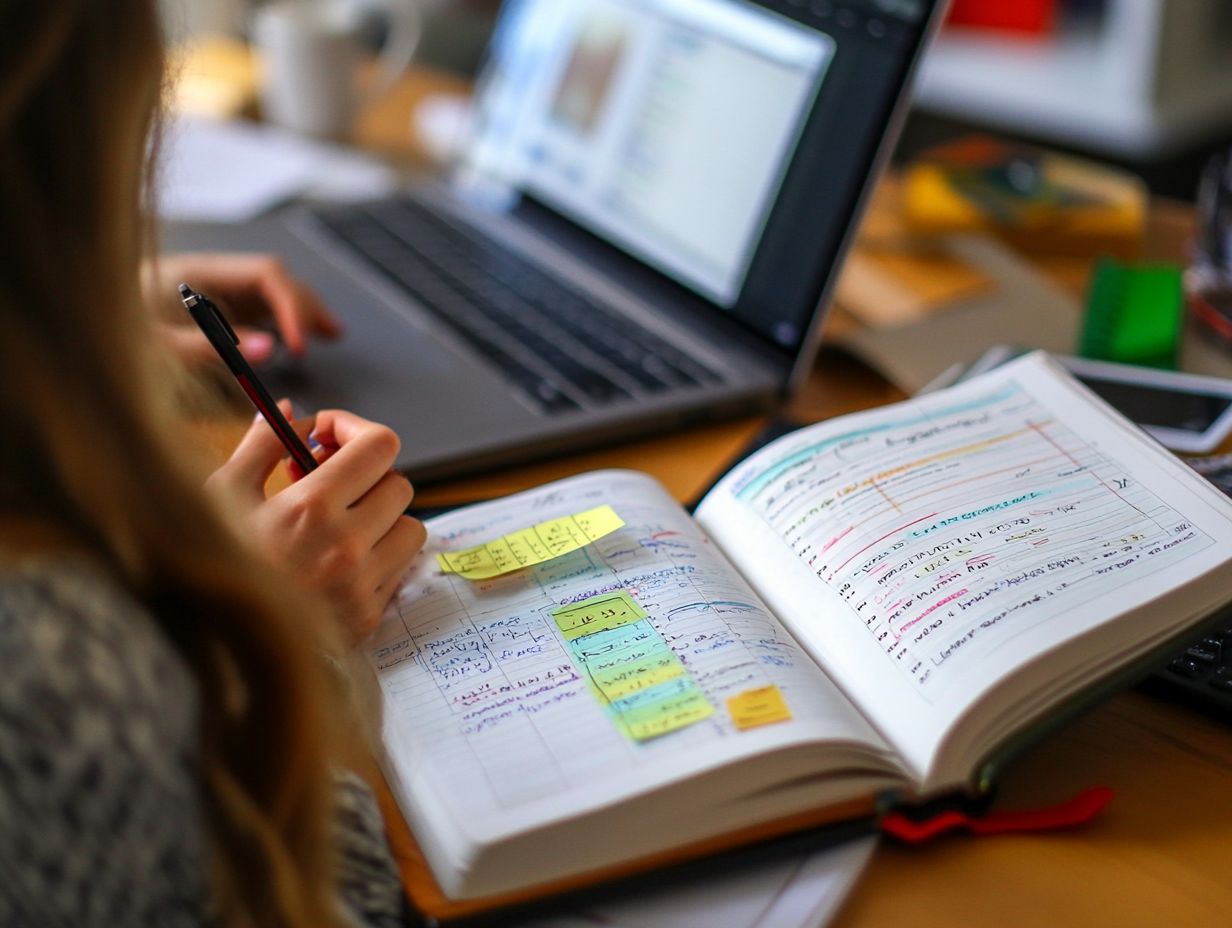5 most effective study techniques for exams
Preparing for exams can often feel like navigating a labyrinth. But with the right strategies at your disposal, you can turn your study sessions into highly productive and effective learning experiences.
This article delves into five essential techniques that will elevate your study routine. You ll learn how to craft a personalized study schedule tailored to your needs, the significance of incorporating breaks and prioritizing sleep, and the advantages of collaborating with fellow students.
Embrace the journey of exam preparation and unlock the keys to making it both efficient and genuinely enjoyable!
Contents
Quick Tips for Effective Studying
Key Takeaways:

Active learning is essential for effective studying. Engage with the material by summarizing, teaching, and applying it in different ways.
Memory techniques such as visualization and mnemonic devices can aid in retaining information for exams, especially when using study techniques for retaking exams.
Creating a study schedule that fits your personal needs and sticking to it can lead to better time management and increased productivity.
1. Practice Active Learning
Active learning is essential if you’re looking to elevate your academic performance. It s all about engaging with the material through effective study methods that foster sustained learning.
By incorporating activities like self-quizzing and retrieval practice, you can turn passive reading into a vibrant learning experience. Creating concept maps is another powerful technique that allows you to visualize relationships between topics.
This enhances your cognitive processing and encourages critical thinking. Effective study skills, including 5 study techniques for science students, such as spaced repetition and interleaved practice, solidify your knowledge and sharpen your concentration.
When you actively engage with the content, you ignite your curiosity and sustain your attention. By varying your study strategies, you can adapt to your unique learning style, making your educational journey enjoyable and impactful.
2. Use Memory Techniques
Utilizing effective memory techniques is essential as a student, especially when gearing up for important exams like AP Biology. Consider implementing science-backed study techniques that significantly enhance your learning retention and recall.
Techniques such as spaced practice, flashcards, and pre-testing can transform the way you process information. For example, using 5 study techniques for reading retention, spaced practice allows you to revisit material at increasing intervals, which fortifies long-term retention.
Engaging in active retrieval quizzing yourself on key concepts promotes a deeper connection with the material. Flashcards are an excellent tool for reinforcing vocabulary and complex theories, making your review process interactive and efficient.
These approaches enhance your reading comprehension and contribute to improved academic outcomes, ultimately boosting your confidence as you tackle challenging subjects.
3. Create a Study Schedule
Creating a study schedule helps manage your time effectively and elevate your studying experience, especially during important exam preparations.
A well-structured routine allows you to designate specific time slots for various subjects, making it easier to focus and keep procrastination at bay. By breaking down larger tasks into manageable segments, you can approach challenging concepts without feeling overwhelmed.
Dedicating shorter, intense study sessions of 25 to 30 minutes, followed by brief breaks, can significantly boost your concentration. This method not only enhances learning outcomes but also helps you pinpoint areas that require more attention.
Incorporating flexibility into your schedule for unexpected events ensures you remain adaptable. This adaptability ultimately contributes to improved academic performance and a more enjoyable studying experience.
Don’t wait! Start your study sessions today!
4. Take Breaks and Get Enough Sleep

Regular breaks and ample sleep are essential for an effective study routine. They directly influence your concentration and academic performance. Many students overlook the significance of rest. Research shows that short study intervals followed by breaks enhance learning and boost information retention.
Incorporating scheduled breaks helps you process and absorb information more effectively. This minimizes mental fatigue and wards off burnout. Quality sleep is crucial for consolidating memories, ensuring that what you’ve learned becomes deeply rooted in your mind.
To prioritize rest, consider techniques like the Pomodoro method, a time management technique that uses timed intervals for focused study sessions interspersed with brief breaks. Create a calming bedtime routine to improve sleep quality, fostering a positive learning environment and nurturing a mindset geared toward academic success.
5. Utilize Study Groups or Partners
Utilizing study groups or partners can elevate your learning experience. It fosters collaborative learning, enhances retention, and creates opportunities for active engagement with the material. Through discussions, quiz sessions, and shared resources, you can develop effective study skills to tackle challenging subjects.
This collaborative environment deepens your understanding through diverse perspectives. It also encourages social interaction, helping alleviate feelings of isolation that often accompany academic work.
Having academic coaches or mentors in these groups can guide you. They help you stay focused while offering insights that might otherwise slip through the cracks.
Set clear objectives for each session, use visual aids, and participate in peer teaching to maximize your group study effectiveness. By dividing topics among members and sharing expertise, you can strengthen your grasp of complex material, leading to successful outcomes in your studies.
How to Stay Motivated During Exam Preparation?
Staying motivated during exam preparation is a challenge many students face. By implementing effective study techniques and strategies, you can boost your chances of achieving your desired learning outcomes!
Set clear goals, mix up your study techniques, and maintain a positive environment to elevate your motivation and boost your academic performance.
Establish a roadmap with specific milestones to track your progress. Positive reinforcement can work wonders. Reward yourself after completing a study session or seek encouragement from friends to lift your spirits.
Master time management by breaking study sessions into manageable chunks. Regular breaks are essential for keeping your focus sharp. Create a stimulating study area free from distractions and clutter to foster concentration.
Incorporate calming music or inspirational quotes as constant reminders of your goals and the immense potential you possess.
What Are the Most Effective Memory Techniques for Studying?
The most effective memory techniques for studying include retrieval practice, self-quizzing, and using flashcards. To further improve your study habits, consider exploring 5 study techniques for success in competitive exams. These strategies enhance retention and recall.
Engage actively with the material to reinforce your understanding and boost your ability to retrieve information during exams. Retrieval practice encourages recalling information without prompts, strengthening the neural connections tied to that knowledge.
Self-quizzing is a fantastic strategy for testing your grasp of content, helping you pinpoint areas needing more attention. Flashcards serve as a quick reference tool, allowing for spaced repetition a proven technique that embeds information into your long-term memory.
Research shows these techniques keep you motivated and lead to improved performance on assessments, significantly enhancing both memory and comprehension, including 5 study techniques to improve memory retention.
Start applying these tips today and watch your study skills soar!
How to Create a Study Schedule That Works for You

Creating a study schedule that works for you requires good time management and organization. Flexibility also plays a key role in adapting your habits to fit your needs.
First, evaluate your current study habits. Identify where you spend too much time or struggle with procrastination.
Utilizing assessment tools like quizzes or self-reflections can help you understand which topics need extra attention. Make a list of subjects that require more time and organize them accordingly.
Flexibility is crucial in a successful study schedule. Be ready to adjust your plan as new commitments arise or when a challenging concept takes longer to grasp.
This adaptive approach keeps you on track and helps you stay engaged in your studies.
Benefits of Studying in a Group
Studying in a group has many advantages. It boosts learning retention and opens up collaborative discussions.
When you study with others, you can share knowledge and ideas. This exchange leads to a better understanding of the material.
Group study sessions can enhance motivation and accountability. You and your peers will encourage each other to stay focused on your goals.
To create an effective study group, choose committed members, establish a regular schedule, and set clear objectives for each session.
Strategies like focusing on specific topics or rotating leadership roles can enhance productivity and ensure everyone participates.
Incorporating Active Learning into Your Study Routine
Active learning can significantly improve your academic performance. Transform your study methods into engaging activities.
Try techniques like group discussions and self-quizzing. These methods stimulate critical thinking and deepen your understanding.
Additionally, tackle practice problems to reinforce your knowledge. Hands-on projects and real-life problem-solving scenarios invite collaboration.
Encouraging yourself to teach the material to peers is another powerful strategy. This approach aids retention and makes the study process enjoyable.
By prioritizing engagement and interaction, you can create a study environment that is both meaningful and effective.
What Are the Common Mistakes to Avoid When Studying for Exams?
Common mistakes made while studying for exams can easily derail even the most dedicated students. These pitfalls often arise from ineffective study skills, poor time management, and a lack of structure in study habits.
Recognizing and tackling these issues is crucial for maximizing your learning retention and achieving your academic goals.
For example, you might underestimate the power of a designated study space, which can profoundly influence your focus and productivity. Cramming the night before an exam often leaves you with only a surface-level grasp of the material, rather than helping you truly understand and retain it.
Effectively managing your time and breaking study sessions into bite-sized chunks will enhance concentration and minimize anxiety. Self-awareness is key; understanding your unique learning style helps you choose the best study techniques for college exams that resonate with you, enriching your study experience.
Frequently Asked Questions

What are the 5 most effective study techniques for exams?
- Create a study schedule.
- Use flashcards.
- Practice past exams.
- Teach the material to someone else.
- Take breaks.
How do I create a study schedule?
To create a study schedule, first determine how much time you have before your exam. Break your study time into smaller chunks and assign certain topics to each chunk. Leave some extra time for review and breaks.
Why are flashcards an effective study technique?
Flashcards are effective because they let you break down information into smaller, manageable pieces. They also aid memorization and recall since they require active participation.
Should I practice past exams as a study technique?
Yes! Practicing past exams is a highly effective technique. It familiarizes you with the format and types of questions, helping you identify areas that need focus.
Is it helpful to teach the material to someone else?
Absolutely! Teaching the material to someone else solidifies your understanding and retention. It also helps you pinpoint areas needing clarification or further study.
Why is taking breaks important when studying for exams?
Taking breaks is vital because it allows your brain to rest and recharge. This will help you avoid burnout and boost your overall focus and productivity during study sessions.






